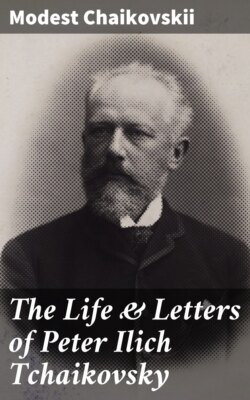Читать книгу The Life & Letters of Peter Ilich Tchaikovsky - Chaikovskii Modest - Страница 15
На сайте Литреса книга снята с продажи.
II
ОглавлениеTable of Contents
In spite of the important conversation at the supper-table, in spite of the spiritual regeneration of Peter Ilich and the change in his relations towards his family, his life remained externally the same. He kept his official berth, and continued to go into society, frequenting dances and theatres. Of all the pleasures he pursued, of all the desires he cherished, only one remained unfulfilled—a tour abroad.
But now even this wish was to be satisfied.
An old friend of his father’s had to go abroad on business. As he was no linguist, it was necessary to take a companion who would act as interpreter, and he proposed that Peter Ilich should accompany him in this capacity. Accordingly in June, 1861, the former writes to his sister:—
“As you probably have heard already, I am to go abroad. You can imagine my delight.... This journey seems to me at times an alluring, unrealisable dream. I shall not believe in it until I am actually on the steamer. I—in Paris! In Switzerland! It seems ridiculous to think of it!”
In July Tchaikovsky started with his friend, but not by steamer.
Their first halting-place was Berlin. In those days every Russian considered it his duty to run down this city. To this duty—or rather custom—Peter Ilich contributed his due. After he had visited Kroll’s, and a dancing saloon, and seen Offenbach’s Orphée aux Enfers, he writes with youthful naïveté: “Now we know our Berlin thoroughly, and have had enough of it!”
After Berlin came Hamburg, which Tchaikovsky found “a considerable improvement.” Brussels and Antwerp did not please him at all. At Ostend they stayed three days. “It is beautiful here,” he wrote. “I love the sea, especially when it foams and roars, and these last days it has been furious.”
Next they went on to London. “Our visit would be very pleasant were it not for the anxiety about your health,” he wrote to his father. “Your letters are awaiting me in Paris, and my heart yearns for them, but we must remain here a few days longer. London is very interesting, but makes a gloomy impression. The sun is seldom visible, and it rains all the time.” Here Tchaikovsky heard Patti for the first time, and although later in life she fascinated him, now he could see “nothing particular” in her.
As might be expected, Paris pleased him best of all the towns he visited. Life in the French capital he found delightful. The six weeks which he spent in Paris were the culmination of his pleasure trip. But in the midst of his enjoyment he experienced a complete disenchantment with his travelling companion. After a series of painful misunderstandings they separated, and Peter Ilich returned to Russia alone about the end of September.
Intellectually and artistically, Tchaikovsky profited little by this journey. Indeed, it is astonishing how little sensitive he seems to have been at that time to all such impressions. In the three months he was abroad he only acquired one positive piece of information—where one could derive the greatest pleasure. And yet his journey was not altogether wasted. In the first place, it brought home to him the strength of his attachment to his own people. He missed the twins most of all. “Take care, father, that Toly and Modi[6] are not idle.” “Are Toly and Modi working well?” “Don’t forget to tell the examiner that Toly and Modi are prepared for the upper division,” so runs the gist of his letters.
Secondly, on this journey he learnt to realise the inevitable end of an idle and pleasure-seeking life, and to recognise that it led to nothing, and that existence held other and nobler aims than the pursuit of enjoyment. The various distractions of Parisian life brought about a wholesome reaction, and on the threshold of a new career he could look quietly on the termination of his former life, conscious only of an ardent desire to step from the shadow into God’s daylight.
Soon after his return he wrote the following letter to his sister:—
“October 23rd (November 4th), 1861.
“What shall I tell you about my journey? It is better to say nothing. If ever I started upon a colossal piece of folly, it was this same trip abroad. You remember my companion? Well, under the mask of bonhomie, which made me believe him to be a worthy man, was concealed the most commonplace nature. You can imagine if it was pleasant to spend three months with such a fellow-traveller. Added to which I ran through more money than I could afford and got nothing for it. Do you see what a fool I have been? But do not scold me. I have behaved like a child—nothing more.... You know I have a weakness: as soon as I have any money I squander it in pleasure. It is vulgar, wanting in good sense—I know it—but it seems in my nature. Where will it all lead? What can I hope from the future? It is terrible to think of. I know there will come a time when I shall no longer be able to fight against the difficulties of life. Until then I will do all I can to enjoy it. For the last fortnight all has gone badly with me; my official work has been very bad. Money vanishes like smoke. In love—no luck. But a better time will come soon.
“P.S.—I have begun to study thorough-bass, and am making good progress. Who knows, perhaps in three years’ time you will be hearing my opera and singing my arias.”
